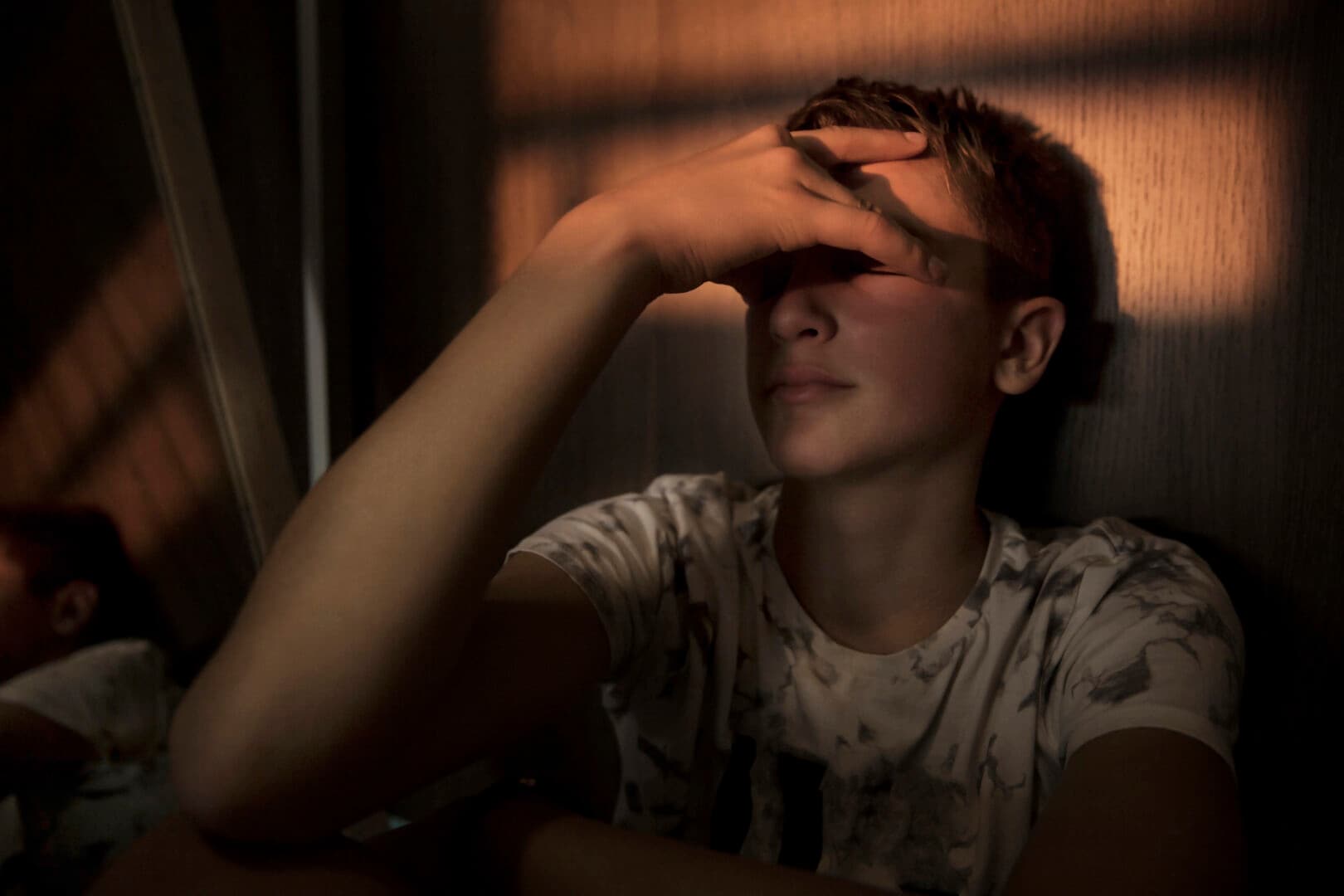In terms of teen mental health, boys aren’t generally at the forefront of the conversation. Data even suggests boys are underserved when it comes to getting help for issues like anxiety and depression — but that doesn’t mean they’re not suffering. Anxiety and depression in teen boys has been on the rise in the past few years, yet they’re still less likely than teen girls to talk about it or seek help.
“Males in our culture are still socialized to exhibit strength and invincibility, more so than girls,” says Dr. Stuart Lustig, a psychiatrist and national medical executive for behavioral health at Cigna. “Adolescent girls also tend to talk more about their feelings than their male counterparts, which gives them a stronger, more meaningful social network. Boys don’t share feelings the way that girls have always been socialized to do, and they may even have been discouraged from doing so.”
“Boys don’t share feelings the way that girls have always been socialized to do, and they may even have been discouraged from doing so.”
—Dr. Stuart Lustig, psychiatrist
It’s also worth noting that, for many boys, such negative feelings start before adolescence; they just may not be aware. “Many issues of depression and anxiety in boys start prior to adolescence and begin to blossom during,” notes Ian Parker, licensed clinical social worker and clinical director at Newport Healthcare in Connecticut. As boys mature, their awareness increases and they often become more independent and social, according to Parker. “During this developmental stage, teen boys tend to struggle with insecurities, guilt, not fitting in with peer groups and other psychosocial stressors around this time.”
From how symptoms can manifest to what to do, here’s what experts want you to know about anxiety and depression in teen boys, as well as other adolescent mental health concerns.
Teen boys and mental health: Why aren’t they getting the help they need?
Across the board, experts agree: Societal stigmas prevent teen boys from getting help they may need. “There’s a double standard still when it comes to addressing mental health concerns for girls and boys,” says Parker. “Girls are encouraged to talk about their feelings and taught that it’s OK to show emotion, where boys are still socialized to be ‘tough’ and to ‘man up’ when they express vulnerability or self-doubt.”
The detrimental result, according to Parker: “Teen boys are far less likely than girls to talk with friends or family about being depressed, anxious or suicidal, and even less likely to seek mental health help.” Additionally, Parker notes, “teen boys may lack the mental health literacy — the ability to recognize and discuss their mental health — to put into words what they are experiencing.”
Depression and anxiety can also be harder for parents and caregivers to spot in teen boys since it doesn’t fit the typical description. “While girls tend to turn inward, boys can explode outward behaviorally and verbally,” explains Robert Hinojosa, a licensed clinical social worker in Little Rock, Arkansas. “Depression may not look like a down mood, but anger instead. Anxiety may not look like panic or worry, but procrastination or even obsession over tasks and perfectionism. Boys just tend to display symptoms in a more outward way, so changes in these behaviors are what to look for.”
“Depression may not look like a down mood, but anger instead. Anxiety may not look like panic or worry, but procrastination or even obsession.”
— Robert Hinojosa, licensed clinical social worker
Boys who display more severe symptoms, especially behavioral ones, adds Hinojosa, “tend to receive punishment or corrective actions from systems rather than psychological intervention.” As a result, “More often than not, boys have already encountered systemic behavioral correction efforts or the criminal justice system before they end up in a therapist’s office,” he says, which can reinforce the idea that mental disorders are something to be corrected.
“More often than not, boys have already encountered systemic behavioral correction efforts or the criminal justice system before they end up in a therapist’s office.”
—— Robert Hinojosa, licensed clinical social worker
How did the pandemic increase anxiety in teen boys?
While the pandemic no doubt affected everyone, when it comes to teens, much of the talk has been centered around girls. Data, which again, can be skewed, as girls are more likely to talk about their feelings than boys, points to girls being more affected. But teen boys’ mental health took a hit, too.
Decreased physical socialization (such as playing basketball with friends), increased shallow (digital) communication, as well as the loss of daily rhythms (school, sports, etc.) and rites of passage (graduation and prom) all contributed to the negative effects on adolescent male mental health.
In fact, a poll from C.S. Mott Children’s Hospital found that the pandemic caused one in five teen boys to experience new or worsening anxiety — an 18% increase in depression in teen boys and a 19% uptick in parents of teen boys noting increased anxiety or worry with their child.
Other causes of anxiety and depression in teen boys
According to Dr. Kendra Read, attending psychologist at Seattle Children’s, the causes of anxiety and depression in teen boys are the same as in teen girls. “Genetic predisposition and environmental stressors can all cause mental health issues for teens,” she says. “However, there may be differences in which environmental stressors have greater impact for different youth.”
Here’s a list of environmental stressors that tend to affect teen boys, according to Read:
Social media. When it comes to social media, research shows girls are more affected. But teen boys aren’t impervious. “We know that social media negatively impacts teens’ mental health, boys included,” Lustig points out. “Social media exposes kids to bullying, unrealistic views of reality and peer pressure.”
Family pressure. “Pressure and expectations from family to play a sport or other activities that are traditionally viewed as male dominated can be a stressor,” notes licensed clinical social worker and empowerment coach in Woodbridge, New Jersey, Lena Suarez-Angelino. “Teen boys can be mocked and dismissed when showing emotions and vulnerability — even by family — giving the impression that boys should be tough and strong all the time.”
Exclusion. “Boys are affected by changes in their social lives,” Lustig notes. “Maybe it’s a new school or not making a sports team or even a first breakup. We’ve all been there — feeling like we are an outsider to a group that we once considered ourselves a part of, and teenagers are still learning how to appropriately deal with those emotions.”
Gender identity. According to Suarez-Angelino, homophobia is more likely to occur in families when their teen boy is questioning their sexuality and/or gender identity. Additionally, teens in the LGBTQ+ population have reported a higher increase in anxiety and thoughts of suicide than cisgender and straight youth during the pandemic. This is in addition to the fact that the former, historically speaking, has a higher rate of suicide attempts than the latter.
Trauma. “Another major source of anxiety and depression can be trauma,” notes Parker. “It is a parent’s worst fear in many ways to confront this idea. Trauma can range from being extremely significant and debilitating to unseen wounds a teen carries with them day to day. Caregivers should avoid self-blame and try to overcome any shame of the possibility of trauma playing a role.”
According to the Anxiety and Depression Association of America (ADAA), trauma is “exposure to actual or threatened death, serious injury or sexual violence.” This can be in the form of direct exposure, witnessing an event or even learning about a traumatic event that occurred to a loved one. A traumatic event may cause a person to “internalize negative thoughts about themselves” or the world (depression); or it can cause “an increase in generalized worries to panic attacks” (anxiety).
Red flags of depression and anxiety in teen boys
According to Read, parents should always keep an eye out for marked changes in their teen’s behavior or the “inability to do what they want or need to do due to apparent fear, worry, sadness or withdrawal.”
“Since we cannot read our teens’ minds, we often look for behavioral markers as observers,” she says. “Avoidance is the hallmark behavioral feature of anxiety, and behavioral withdrawal or excessive crying is the same for depression.”
Here, more specific red flags to look for:
- Prolonged periods of irritability and frustration with everyday items, like homework or chores.
- Changes in behaviors, including hygiene, appetite and sleep.
- Frequent changes in mood, including acting aggressive, irritable and hostile.
- Prolonged lack of motivation.
- Loss of interest in activities once enjoyed, such as sports, friends and video games.
- Substance use.
- Incidents or altercations with peers.
- Withdrawal from family.
- Avoidance of social situations (social anxiety) out of fear of being judged.
How to help teens boys with anxiety and depression
Parker notes that many of the signs are non-verbal with boys, so it’s important for parents and caregivers to tune in to their children and pay attention to any changes in their behavior. If depression or anxiety are suspected, here are ways to help:
Talk about feelings regularly. Ideally, this is done from an early age, so teen boys feel comfortable going to their parents with any issues. “When conversations about feelings and emotions are routinely accepted in the household — by both male and female caregivers — teenage boys will feel more willing to share,” Lustig says.
“Even though boys tend to manifest symptoms in behavioral ways, they will let you in if they feel you’re a safe person and will not judge them,” Hinojosa says. “Be open to talking about the things when they’re ready and ask them about their behaviors or feelings when you notice things, but in a non-judgemental way.”
“Even though boys tend to manifest symptoms in behavioral ways, they will let you in if they feel you’re a safe person and will not judge them.”
— Robert Hinojosa, licensed clinical social worker
Validate their feelings with shorthand, if necessary. On the same token, make sure you accept and support your child’s feelings. “When parents validate emotional states they observe, even if they’re incorrect, they show that those feelings are OK,” Read says. “It can be hard for teens to want to engage in a long dialogue about how they are feeling so sometimes employing a rating scale can be a helpful shorthand way to check in or take the temperature of the situation.”
She gives the example: “Seems like you’re feeling frustrated right now. Real quick 0-10, how big are you feeling right now?”
Share your feelings. It is also important for you to observe your feelings out loud, Read adds. “You can say: ‘Wow, I’m feeling pretty embarrassed about walking into that meeting late,’ which allows it to be OK to experience these very human emotions.”
“Often teenage boys shut down and become very quiet when you try to talk to them,” Parker says. “By strategically sharing your own experiences and struggles, you’re opening up a dialogue. Often teens feel alone in their struggles, so talking about your own upbringing can help them feel less alone, and also model healthy sharing of emotions.”
Get them involved. “Encourage your child to find their interests and develop those interests — whether it’s a club at school or one in the community,” Lustig says. “Teenagers and children who have a strong support system are often less lonely and more resilient than those who don’t.”
“Teenagers and children who have a strong support system are often less lonely and more resilient than those who don’t.”
— Dr. Stuart Lustig, psychiatrist
Keep it structured. “Teens thrive on structure and having more structure assists in maintaining mental and physical stability,” explains Parker. A lot of boys have a lot of energy, even when they hit adolescence. Getting them involved in something physical is often beneficial, even if they are reluctant to partake. And on that same note, set limits on screen time.
Enlist a professional. “If you do suspect that your teenager or child may be experiencing anxiety or depression, don’t wait to get help,” Lustig says. “Contact your child’s pediatrician, who should be able to provide a behavioral health specialist in your area or even a virtual care provider. Regardless of the condition, treatment by a licensed therapist or psychiatrist can be very effective.”
If you suspect trauma is at the root of your teen’s anxiety or depression, seek help as soon as possible and mention your concerns to your child’s health care provider. There are a number of effective treatments for trauma, including exposure therapy and trauma-focused cognitive behavior therapy; and, according to the ADAA, delaying treatment “may lead to a detrimental impact on mental and physical health.
In addition to getting in-person help, Suarez-Angelino recommends sharing the following sites with teen boys:
Find support for yourself. “Raising teenagers is hard work and every parent is facing a struggle,” Lustig says. “Because of this, it’s important for parents to have support. By connecting with others who may be in your same boat and taking care of your own mental health with the help of a professional, you are better equipped to take care of your teenager.”
The bottom line
Figuring out how your teen boy is feeling may take a little digging, but it’s crucial red flags aren’t overlooked. Lay the groundwork for an open, supportive environment early on. “By encouraging conversations and being engaged in your son’s life before the teenage years start, you can develop a relationship that is built on trust and support,” Lustig says. “Even teenagers want to know that their parents care, no matter how many times they tell you they don’t — and a big way you can do that is by simply being present.”





